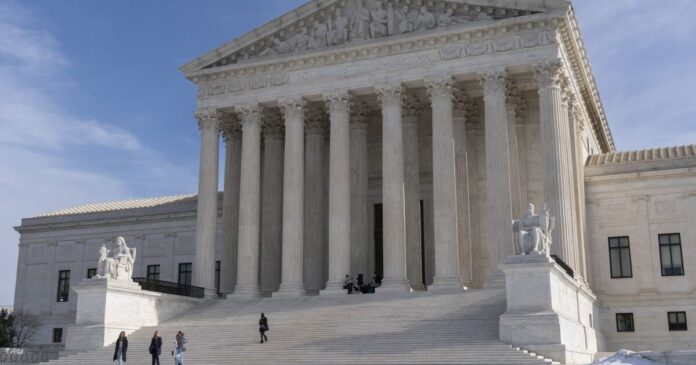The Supreme Court on Thursday dismissed a major challenge to the internet’s legal shield known as Section 230, which has long protected social media websites from being sued for what users post there.
In a short unsigned opinion, the court said it would not rule on the potentially momentous issue because the plaintiffs who sued had no valid claims that Twitter or Google had aided terrorists, an allegation that was at the heart of their lawsuit.
The outcome came as relief for the social media sites including Facebook and YouTube that have grown and prospered thanks to the protections set by Congress at the dawn of the internet.
“This is a huge win for free speech on the internet,” said NetChoice Litigation Center Director Chris Marchese. “The court was asked to undermine Section 230 — and declined.”
But the justices left open the question that first drew their attention, which suggests it could return in a future case.
Section 230 had been dubbed “the 26 words that created the Internet” because it said “interactive computer service” can be a platform for free speech and shall not be “treated as the publisher or speaker of any information” posted there.
While publishers and broadcasters can be sued for whatever they print or put on the air, interactive websites are shielded under the law.
In recent years, critics complained that social media companies were pushing the limits of those protections by using computer algorithms to steer users toward content that might be of interest to them based on their past activity. At times those algorithms direct users to content that could be deemed as dangerous, violent or offensive.
Critics argued that even if companies are not held liable for what their users post, these suggestions to guide users to similar content should not be protected and are essentially the speech of the companies.
The Supreme Court had never ruled on Section 230, but last year it sent a shudder through much of the high tech industry when it agreed to hear a pair of cases that challenged the legal immunity for websites.
They came from victims and survivors of terrorist attacks. In 2016, Congress made it easier to sue those who “aid or abet” an act of international terrorism by “knowingly” providing “substantial assistance” to the perpetrators.
In Twitter vs. Taamneh, the 9th Circuit Court of Appeals had cleared the way for the social media platforms including YouTube and Google to be sued on the grounds that their sites had helped recruit terrorists who carried out a nightclub attack in Istanbul.
Meanwhile, in Gonzalez vs. Google, the court agreed to consider whether the platforms could be held liable — despite Section 230 — because their algorithms played a role in recruiting terrorists.
In February, the justices heard arguments over two days in the two cases, starting with the focus on algorithms. During the second day, several justices voiced skepticism over the underlying lawsuit in the terrorism case.
On Thursday, they handed down a 9-0 ruling dismissing the aiding and abetting lawsuit against Twitter. Justice Clarence Thomas said such claims should be limited to “truly culpable conduct,” and there was no convincing allegation that Twitter had knowingly helped recruit terrorists.
Based on that conclusion, the justices then dismissed the companion case that raised the issue of algorithms. Since the underlying lawsuit cannot proceed, “we therefore decline to address the application of §230 to a complaint that appears to state little, if any, plausible claim for relief,” the court said.
Senate Judiciary Committee Chairman Dick Durbin (D-Ill.) said the court’s non-decision should prompt Congress to change Section 230. Both Republicans and Democrats have been critical of the growing power and influence of Big Tech.
“The justices passed on their chance to clarify that Section 230 is not a get-out-of-jail-free card for online platforms when they cause harm,” Durbin said. “Enough is enough. Congress must step in, reform Section 230, and remove platforms’ blanket immunity from liability.”




